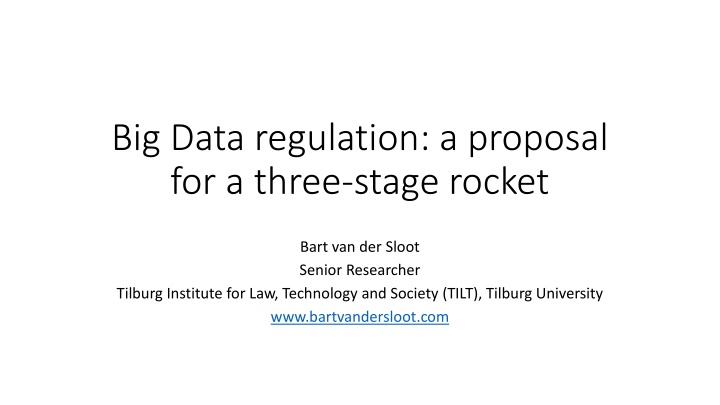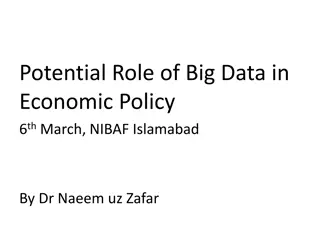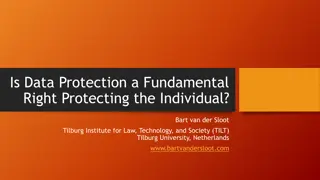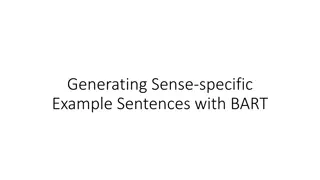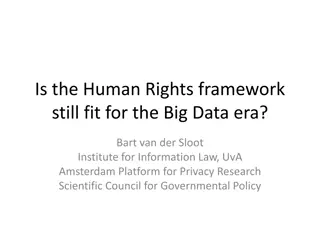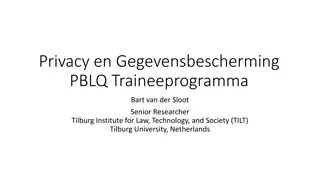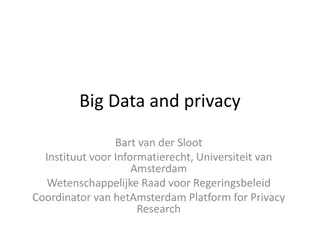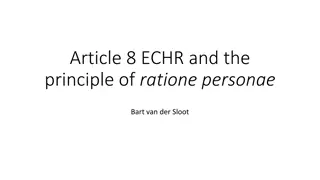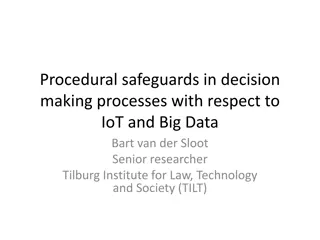Proposal for Big Data Regulation: A Three-Stage Rocket by Bart van der Sloot
Bart van der Sloot, a Senior Researcher at Tilburg Institute for Law, Technology and Society, presents a comprehensive proposal for regulating big data. The content delves into the background, issues with current privacy paradigms, research analysis, and a detailed proposal addressing the challenges posed by new technological advancements. Van der Sloot emphasizes the need to shift focus towards societal impacts of data technology, rather than just individual rights.
Download Presentation

Please find below an Image/Link to download the presentation.
The content on the website is provided AS IS for your information and personal use only. It may not be sold, licensed, or shared on other websites without obtaining consent from the author.If you encounter any issues during the download, it is possible that the publisher has removed the file from their server.
You are allowed to download the files provided on this website for personal or commercial use, subject to the condition that they are used lawfully. All files are the property of their respective owners.
The content on the website is provided AS IS for your information and personal use only. It may not be sold, licensed, or shared on other websites without obtaining consent from the author.
E N D
Presentation Transcript
Big Data regulation: a proposal for a three-stage rocket Bart van der Sloot Senior Researcher Tilburg Institute for Law, Technology and Society (TILT), Tilburg University www.bartvandersloot.com
Overview (1) Background (2) Problem (3) Research (4) Proposal
(1) Background Legal and philosophical background Worked at the Institute for Information Law (IViR), University of Amsterdam Received a Top Talent Research Grant of the Dutch Scientific Organisation (NWO) for doing a Phd project: Privacy as virtue Worked at the Dutch Scientific Council for Government Policy (WRR) > Big Data and Privacy Now at the Tilburg Institute for Law, Technology and Society (TILT), Tilburg University More information on: www.bartvandersloot.com
(2) Problem Current privacy & data protection paradigm is mostly focussed on protecting indivdiual rights and interests Peronal data is linked to the natural person GDPR places emphasis on indivdiual rights Article 8 ECHR > practically, only natural persons can complain Article 8 ECHR > practically, only indivdiual interests are provided protection.
(2) Problem This works well for traditional privacy violations But new technological developments challenge this focus Individual rights Not aware of violations To many data processing activities Conflicting individual rights Individual interests How do these new technologies harm individuals? Are these new technologies really about individuals? Do they pose legal questions or rather societal questions?
(3) Research Prolem analysis: Focus on European legal framework Primarily Article 8 ECHR & Data Protection Directive/GDPR Historical analysis of how these doctrines developed over time Developing alternatives: Focus on legal/policial philosophy Virtue ethics Lon Fuller
(3) Research Chapter II Article 8 ECHR Original Approach Current Approach Right Objective rights Subjective Rights Interest General Interests Indivdiual Interests Test Necessity Balancing Regulation Ethical/legal Legal Data Protection Original Approach Current Approach Rights Few individual rights Indivdiual control Obligations Duties of care Detailed obligations Test Necessity Balancing Regulation Code of conduct Black letter law
(3) Research Chapter III When the Court is faced with cases about mass surveillance it is increasingly willing to allow for exceptions, resulting in the Zakharov case Abstract test Legal persons No harm Legality Societal interests Conventionality (Positive obligations)
(3) Research Chapter IV How can we explain, understand and expand such an approach? Deontology Utalitarianism Virtue ethics Focusses on the agent Virtues such as temparance, honesty, justice Combination on negative and positive obligations Legal rights and obligations, but also ethical and open norms
(3) Research Chapter IV Negative obligations Data regulation Analysis phase In abstracto Positive obligations Design algorithms > discrimination Diversity by design Use of power > empowerment
(4) Proposal Letting go of the focus on individual rights Allow in abstracto claims The current legal regime primarily focuses on in concreto judgements. It requires that the applicants must be harmed individually by the law or policy complained of. Courts then assess matters on a case by case basis, that is, on the particular circumstances of the case. However, it is often difficult to substantiate individual harm in Big Data processes. Moreover, it is increasingly difficult for individuals to uphold their individual rights in a world where data processing is so omnipresent. That is why it may be valuable to accept in abstracto claims. In such cases, laws or policies are assessed on their own merits, without it being necessary that they have been applied in practice of that they have or will have potential negative effects on the interests of the individual when applied in practice. Rather, the laws and policies are assessed in abstract terms, for example by assessing their intrinsic qualities. Allow class actions (actio popularis) The current privacy regime grants rights specifically to individuals, that is, natural persons. This also holds true for the right to data protection, because personal data are commonly defined as data that identify a natural person . The difficulty with this approach is twofold. First, people are often simply unaware that their personal data are gathered. Secondly, there is often an inequality of arms. Big Data processes are often initiated by large multinationals such as Google, Apple and Facebook or by states intelligence services, police or tax authorities. Individual citizens are mostly ill-equipped and underfinanced to engage in long and difficult legal proceedings regarding highly complex, sophisticated technologies. That is why it may be valuable to allow for class actions (actio popularis). In such claims, civil society organizations and groups are allowed to submit complaints about a privacy violation. Allowing these types of claims in European case law might mean that over time, specialized organizations may be created that have as primary goal engaging in these types of class actions.
(4) Proposal Letting go of the focus on individual interests Focus on societal interests The current privacy paradigm is primarily, though not exclusively, focused on protecting personal interests. This is increasingly problematic in the age of Big Data, because large scale data processing practices often transcend the individual and her interests. That is why it might be valuable to also take into account general and societal interests when assessing cases regarding large data processing initiatives. Such societal interests may be linked, inter alia, to the prevention of abuse of power by states, but also to the question of whether the state is using its power optimally, for example, by creating a (technological) environment that allows for diversity, for human flourishing and for citizen empowerment. Regulate data The current legal regime differentiates between, inter alia, private and public data, content and metadata, anonymous and personal data, statistical and sensitive personal data, etc. Their protection depends on the question of whether the data can be linked to the individual, can be used to identify a person or has an impact on a natural person. There are generally two problems with this approach. First, as was stressed previously, the link to a specific individual and her interests is increasingly insufficient to address all the relevant aspects of data gathering, processing and usage. Second, distinguishing between different types and categories of data, and linking to them a specific regime of protection and of powers for data controllers, is outdated because data are increasingly going through a circular life cycle. That is why it may be valuable to introduce additional regulation of the processing of data as such, independently of whether these data can be qualified as personal, private or sensitive data. Similarly, rules could be developed for the analysis of data by computerized means.
(4) Proposal Letting go of the focus on balancing interests Focus on intrinsic qualities of laws and policies The current regulatory regime is primarily concerned with determining the outcome of cases and assessing the quality of laws and policies on the basis of their potential positive and negative effects. A privacy violation is primarily seen as a negative effect that may result from data processing activities, while efficiency, security or transparency are the positive effects that may result from them; while the negative effects are primarily focused on the individual level, the positive effects are mostly formulated on a societal level. The negative and positive consequences are weighed and balanced against each other. However, because both individual and societal interests in Big Data processes are increasingly abstract and vague, balancing those interests becomes increasingly difficult. That is why it may be worthwhile to focus on the minimum requirements of the law. These rule-of-law-based principles, guaranteeing the basic legitimacy and legality of laws and policies, should be respected even when no individual rights or interests are at stake. As these are minimum requirements, they should be respected at all times; no balancing exercise takes place. Focus on the aspirations of laws and policies The current legal (privacy) paradigm is primarily focused on laying down duties and minimum requirements. Because technological developments are so rapid and because the interests at stake are often abstract and societal in nature, it might be worthwhile to focus more on the aspirations of laws and policies. Seeing the legal order as a purposive enterprise allows for such an approach, as the legal order is created and designed in such a way that human freedom is respected. The natural end of a legal order is promoting human freedom to the maximum extent possible. Such aspirations could be, inter alia, promoting a society with maximum diversity, autonomy and freedom.
(4) Proposal Letting go of the focus on black letter law Focus on ethical rules The current paradigm places its bets mainly on the legal regulation of rights and obligations black letter law. Yet it is increasingly questionable whether and to what extent this form of regulation still suffices in the Big Data era. That has to do with a number of issues. First, data processing is increasingly transnational. This implies that more and more agreements need to be made between different states and organizations in different jurisdictions. Hard legal rules are often difficult to agree upon due to the difference in traditions and legal systems. Furthermore, rapidly changing technology has the effect that specific legal provisions can easily be circumvented and that unforeseen problems and challenges may arise. And, as discussed, many of the problems arising from Big Data practices are social and societal. It is questionable whether those concerns should be dealt in full within the juridical discourse. It could be promising to regulate Big Data processes additionally through forms of soft law and ethical standards, such as duties of care and codes of conduct. The underlying normative principles and values to be guaranteed in Big Data processes remain relatively stable. One could also look to other sectors for inspiration, for example the idea of installing ethical oversight committees, such as is a common practice in the medical sector. An interdisciplinary group of experts, consisting for instance of lawyers, ethicists, engineers and practitioners, could assess specific plans, policies and experiments. Adopt a more hybrid approach The current regulatory regime is based on numerous categorizations, labels and distinctions. For example, distinctions can be made between the offline and online, between the analog and digital environment, between the protection of privacy in the private and in the public domain, between different nations and jurisdictions, between times of war and times of peace, between the powers and capacities of organizations in the private sector and in the public sector, and between different organizations in the public sector (for example in relation to which data they may gather, how they might use them and for what purposes; the intelligence agencies have broader powers to process data than the police, and the police has broader powers than the social services). In the Big Data era, however, the world is becoming increasingly fluid. Although the rights of citizens are currently linked mainly to physical objects such as the body and the home, and certain forms of communication such as the secrecy of correspondence, the Big Data era requires that one s digital identity, internet communications and privacy in the public domain be protected equally. Likewise, in Big Data processes, data streams increasingly circulate between the private and the public sector and between different governmental agencies. Future regulation will need to standardize the rules applicable to those different sectors.
(4) Proposal Three-stage rocket (1) Negative obligations (2) Individual Rights (3) Positive obligations
